Food sovereignty
description: right of peoples to healthy and culturally appropriate food produced through ecologically sound and sustainable methods, and their right to define their own food and agriculture systems
36 results
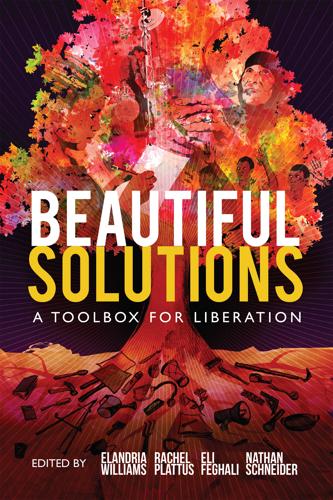
Beautiful Solutions: A Toolbox for Liberation
by
Elandria Williams, Eli Feghali, Rachel Plattus
and
Nathan Schneider
Published 15 Dec 2024
Yet these cooperatives, like CSAs, run the risk of compromising with the market and losing their community focus in pursuit of large-scale production. At the national level, the battle for food sovereignty has brought together organizations and individuals to lobby governments to adopt holistic food policies. Food Secure Canada was formed as a coalition of local initiatives in 2001 under the banner of food security. In 2009, the coalition’s framework shifted to food sovereignty, which led to a national campaign to lobby the government for more inclusive food policies. Food sovereignty must be grounded in local practice, but effective organizing and collaboration between grassroots organizations has led to the formation of international organizations such as the International Planning Committee on Food Sovereignty (IPC).
…
Food sovereignty must be grounded in local practice, but effective organizing and collaboration between grassroots organizations has led to the formation of international organizations such as the International Planning Committee on Food Sovereignty (IPC). The IPC has successfully introduced reforms and brought food sovereignty principles to the table of the Food and Agriculture Organization of the United Nations. The IPC has changed how food security is discussed at the international level, bringing stakeholders to the table, such as peasant farmers, who were previously excluded in these policy meetings. “FOOD SOVEREIGNTY PUTS THOSE WHO PRODUCE, DISTRIBUTE AND CONSUME FOOD AT THE HEART OF FOOD SYSTEMS AND POLICIES, RATHER THAN THE DEMANDS OF MARKETS AND CORPORATIONS
…
LEARN MORE WEBSITE GreenWave. greenwave.org BOOK Eat Like a Fish: My Adventures as a Fisherman Turned Restorative Ocean Farmer by Bren Smith. (2019) penguinrandomhouse.com/books/547069/eat-like-a-fish-by-bren-smith/9780451494542 VIDEO “Can We Restore Our Seas Through Ocean Farming” by World Wildlife Foundation. (2019) youtu.be/0eTvs5182Zo SOLUTION FOOD SOVEREIGNTY Photo of the author, Emi Do, holding cranberry and orca beans. Image provided by Do, used with permission. OVERVIEW Food sovereignty is the right of communities to access healthy and culturally appropriate food and to have control over agricultural and food production systems. More than just access to food, it means being able to choose our food and to participate in producing it.
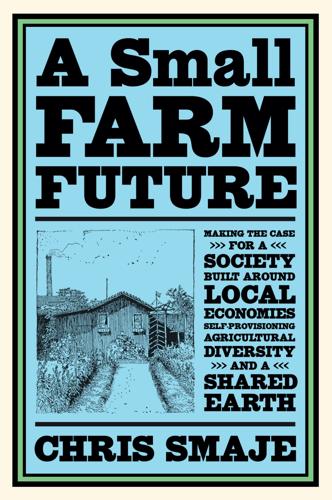
A Small Farm Future: Making the Case for a Society Built Around Local Economies, Self-Provisioning, Agricultural Diversity and a Shared Earth
by
Chris Smaje
Published 14 Aug 2020
The Nyéléni Consensus Another window into that future was produced in the Malian village of Nyéléni in 2007, when the Forum for Food Sovereignty convened by the international peasant organisation La Vía Campesina produced its eponymous declaration, including this passage: ‘Food sovereignty is the right of peoples to healthy and culturally appropriate food produced through ecologically sound and sustainable methods, and their right to define their own food and agriculture systems. It puts the aspirations and needs of those who produce, distribute and consume food at the heart of food systems and policies rather than the demands of markets and corporations.’31 Food sovereignty emphasises ‘growers and eaters’ allying politically at the local level rather than ‘producers and consumers’ relating to each other only by seeking the best price in the market.32 It can be hard birthing such grower/eater alliances out of familiar market relationships, as I know all too well from personal experience as both grower/producer and eater/consumer.
…
Of course, we’re in a privileged position to do so (and most of our customers are in a privileged position to pay more than they strictly must). I’m sympathetic to would-be customers who can’t afford our produce, albeit sometimes a little sceptical of how people define the affordability of food in view of other things they spend their money on. I’m less sympathetic to the notion that food sovereignty is therefore a boutique movement catering only for the middle class, especially since the cheapness of world-market food arises in considerable measure through the poverty it inflicts on many of its workers and wider publics. The unaffordability of good food must be set against the greater unaffordability of housing and land conditioned by capitalist land markets.
…
Building local consensus around producing livelihoods out of the immediate ecological base, though complex and rife with potential for domination, is probably less complex and more potentially egalitarian than the drive to build a global capitalist political economy. In that respect, this book is intended essentially as a defence of food sovereignty principles and a working through of some of their difficulties. The difficulties, I’d argue, are less severe than those bedevilling other kinds of political economy. Suppose we tried to build a global ‘Nyéléni consensus’ to outflank the present ‘Washington consensus’ of global free-market integration?
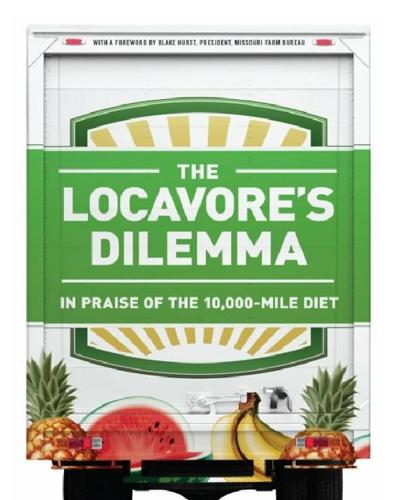
The Locavore's Dilemma
by
Pierre Desrochers
and
Hiroko Shimizu
Published 29 May 2012
Doudou Pierre, the “grassroots” National Coordinating Committee Member of the National Haitian Network for Food Sovereignty and Food Security, said: “We’re for seeds that have never been touched by multinationals.”1 U.S. writer Beverly Bell explains: “The Haitian social movement’s concern is not just about the dangers of chemicals and the possibility of future GMO imports. They claim that the future of Haiti depends on local production with local food for consumption, in what is called food sovereignty.”2 Church groups in the U.S. donated some 13,300 machetes and 9,200 hoes to, I guess, encourage traditional agriculture in Haiti.
…
A Briefing Paper for Civil Society (Section 1) http://www.foodsovereignty.org/Portals/0/documenti%20sito/Home/News/reformed%20CFS_english.pdf; and the websites of organizations such as La Via Campesina http://viacampesina.org/en/ and the International Planning Committee for Food Sovereignty http://www.foodsovereignty.org/. 7 See, among others, Peter Rosset. 2008. “Food Sovereignty and the Contemporary Food Crisis.” Development 51 (4): 460–463. 8 Standard statements to this effect are found in Oakland Institute. 2008. The Food Crisis and Latin America, Policy Brief http://media.oaklandinstitute.org/content/food-crisis-and-latin-america; and Frederic Mousseau. 2010.
…
It is no coincidence that the mention of “traditional agriculture” was given precedence in the Minister’s statement. The reluctance of much of the world to adopt biotechnology is not about the safety of the seed, but rather the preservation of “traditional agriculture” and what the Haitian protesters called food sovereignty. In large parts of the world, local trumps science, and people suffer as a result. The Obama administration has had much to say about local food. The First Lady has planted a garden, organic, of course, and the Department of Agriculture is spending 50 million or so on a program called Know Your Farmer.

What If We Get It Right?: Visions of Climate Futures
by
Ayana Elizabeth Johnson
Published 17 Sep 2024
We’re dependent on our own community labor, our own sweat, and this land that we have mutual regard for in order to feed ourselves. And that jazzes me up. That self-sufficiency tip is really exciting. Ayana: That is exciting. And it’s from you that I learned this term, “food sovereignty.” Leah: La Via Campesina, which is a peasant movement, the largest in the world made up of people who are closest to the Earth, came up with this concept of food sovereignty. It’s the idea that every person has the right to democratic participation in the food system at all levels. It’s a vision for care of the ecosystem as a family member. In a material sense, land is the source of food, the place where we build our shelters, where we gather, where we bury our dead, where we enjoy scenic beauty and healing from nature.
…
See electric vehicles Executive Order on Tackling the Climate Crisis at Home and Abroad (2021), 314–15 extinctions and extinction risk, 34, 35, 128–29 Exxon, 144, 227 ExxonMobil, 263n F Fairness for Farmworkers Act, 83 farmers markets, 73, 155, 156 Farming While Black (Penniman), 76 farmworkers, 61–62, 70, 76, 82–83, 85 fashion and textiles, 200, 201, 229 Federal Energy Regulatory Commission (FERC), 331 FEMA (Federal Emergency Management Agency): flood risk mapping, 359–60 individual disaster assistance, 344, 357–58 local emergency management agency funding program, 353 problems and possibilities, 350–51, 355–59 relocation and, 375 FERC (Federal Energy Regulatory Commission), 331 fertilizers, 410 fifteen-minute city, 113 film, Leonard and McKay on climate communication in, 204–17 finance, 136–96 Clément on accelerating climate mitigation investment, 169–78 disaster-related debt and financial hardship, 148, 252, 270, 344, 357, 358 disaster-related finance needs, 270, 352–53, 354 fossil fuel divestment campaigns, 138, 139, 142, 263n Gallagher on low-carbon development and climate finance, 264, 268–78 helping developing countries meet their NDCs, 253 local emergency management funding, 352–53, 354, 361–62 McKibben on finance-focused climate action, 142–58 in the media and entertainment world, 207, 209, 210, 215 NDN Collective’s financing programs, 384 ocean farming finance, 307, 410, 411–12, 413–14 philanthropic funding for climate mitigation, 138, 139, 263n problems and possibilities, 63, 138–39, 169, 260 Shah on DOE funding programs and priorities, 181–96 See also Inflation Reduction Act fisheries, 304, 307, 378 declines and overfishing, xvi, xxi, 11, 67, 403, 418 See also ocean health and conservation fission, 188 See also nuclear power Flemma, Jean, 312, 313, 315, 316 See also Blue New Deal flooding, 20, 45 adaptive design for, 91, 234 problems and possibilities, 40, 88, 344, 345 socioeconomic impacts of, 251–52, 269–70 See also coastal ecosystems and communities; disasters; sea level rise flood insurance, 359, 360 flood risk mapping, 359–60 food justice certification, 82 Food Solutions New England, 52 food sovereignty, 74 food systems: Donahue on reviving regional agriculture, 50–63 Penniman on food sovereignty, food justice, and regenerative agriculture, 68–85 problems and possibilities, 34, 67–68, 70–71 what transformation looks like, 429 See also agriculture; regenerative agriculture food waste, 200 Foote, Eunice Newton, 14 forest ecosystems, 21, 25, 34, 35, 51 deforestation, 12, 22–23, 34 and the water cycle, 41, 42–43 forestry, sustainable, 52–54, 58 Formosa Plastics, 335–36 40 Acres and a mule, 83n fossil fuel industry: in Alaska, 333–34 in communities of color, 287, 289, 364, 367, 377 early knowledge of climate crisis, 14, 203 human health impacts, 287, 328, 332, 337, 377 lawsuits against, 261 lobbying, foot-dragging, and climate-mitigation opposition, 14, 138, 141, 144, 160–61n, 162 media advertising, 215 oil and gas drilling, 260, 333–34, 339, 340, 377 See also specific companies fossil fuel investment and financing, 138, 145, 151 divestment campaigns and positions, 138, 139, 142, 263n industry subsidies and tax breaks, 139, 164, 260, 376–77, 430 McKibben on finance-focused climate action, 142–58 fossil fuel use/reliance: carbon capture as justification for, 26 ending, 63 human health impacts, 13, 344 lawn and landscaping maintenance, 34 phase-out language in the COP28 agreement, 248 scale and impacts of, 12–13, 22, 138 See also clean energy development; coal; decarbonization; natural gas FPIC (free, prior, and informed consent) rights, 390–91 fracking, 12 Frankenstein (Shelley), 22 Frazier, Garrison, 83n free, prior, and informed consent (FPIC) rights, 390–91 fusion energy, 187, 188, 191 See also nuclear power Future Generations Tribunal, 238–39 G Gallagher, Kelly Sims (interview), 263–81 gardens, 66, 73, 371 General Mining Law of 1872, 339 Generate Capital, 180 generational project, 63 geothermal energy, 183, 186 Give Us Back Our Bones (Deeman), 64, 65 glacial melting, 11, 12 Global Climate Strike, 238, 239–43 Global Environment Facility, 273–74 global stocktake, 266 global warming, 14, 18–19, 22–23, 34 future projections and target warming limits, 18n, 20–21, 24–25, 28–30, 260, 266n Marvel on, 18–25 See also carbon emissions; fossil fuel entries “Global Warming’s Terrifying New Math” (McKibben), 142n GND.
…
A virtuous symbiosis readying soil for future seeds.[*48] Some version of “back to the land” has to be part of our climate solution: more people farming again. Leah Penniman and her family started Soul Fire Farm in 2006, and they have been manifesting such a vision, growing food in a way that is grounded in community, justice, and food sovereignty. I first learned of Leah in December of 2016, when I got this email from my mother: The hour-long video, which I ended up watching in full, was of Leah speaking at a Northeast Organic Farming Association conference. When I interviewed her for this book, she said that it had been her first-ever keynote and she was so nervous, clutching the sweaty paper and feeling like she was all over the place.
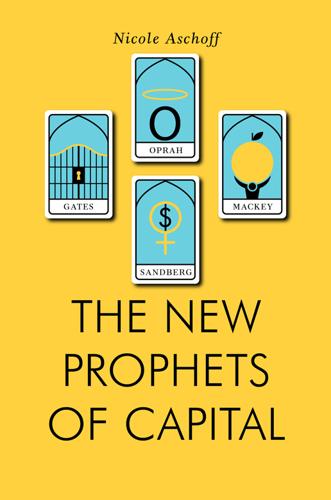
The New Prophets of Capital
by
Nicole Aschoff
Published 10 Mar 2015
The World Bank tried for decades to implement Green Revolution programs in poor African countries, and these efforts not only failed, but left increased levels of inequality, landlessness, and ecological damage in their wake.39 AGRA policies are more sophisticated than the 1980s World Bank policies, but they trot out the same traditional-modern dichotomy, in which traditional (read: Backward) African farming practices are to blame for African poverty and malnutrition—a claim that doesn’t hold up to empirical scrutiny.40 Thus, African farmers should follow the modern (read: Smart) practices of Western farmers to increase productivity and pull themselves out of poverty.41 AGRA is an ongoing program and has generated sustained criticism from activists and political leaders around the world. In October 2014, representatives from six African countries and more than a dozen US food sovereignty groups convened the Africa–US Food Sovereignty Strategy Summit in Seattle. But the outcry against AGRA has had little impact, because the foundation has the resources to pursue any policy goals it wishes. It has used its money to gain support inside the UN and from numerous other foundations and private donors, and it is accountable to no one other than Bill and Melinda Gates.
…
The new “certified” seeds will require increased pesticide use, so the foundation is also supporting the creation of pesticide markets. (The Gates’s ownership of 500,000 shares in Monsanto may partially explain their enthusiasm for genetically modified seeds.) When AGRA was announced it sparked an outcry from scientists, development scholars, and food sovereignty activists from both the Global South and North.38 They argue that the Green Revolution hasn’t passed over Africa, as AGRA’s title suggests. The World Bank tried for decades to implement Green Revolution programs in poor African countries, and these efforts not only failed, but left increased levels of inequality, landlessness, and ecological damage in their wake.39 AGRA policies are more sophisticated than the 1980s World Bank policies, but they trot out the same traditional-modern dichotomy, in which traditional (read: Backward) African farming practices are to blame for African poverty and malnutrition—a claim that doesn’t hold up to empirical scrutiny.40 Thus, African farmers should follow the modern (read: Smart) practices of Western farmers to increase productivity and pull themselves out of poverty.41 AGRA is an ongoing program and has generated sustained criticism from activists and political leaders around the world.
…
“On the assumption that commercially successful systems equal food security and social well-being,” AGRA is proposing that African farmers (most of whom are too poor to buy seeds at any price) buy and use genetically modified seeds, which they are not allowed to reuse or share, as they have done for thousands of years.43 There are serious ecological and developmental dangers in monoculture farming, and agro-ecologists worry about the growing crisis in US and European farming models. All of these problems are brushed aside in the AGRA initiative. The right of countries and their populations to food sovereignty is ignored. People from the West are experts, and African farmers are thought to be too poor and oppressed to come up with solutions and strategies. The example of education in the United States is much the same. The Gateses and other education reformers have decided that the public education system in this country is broken.
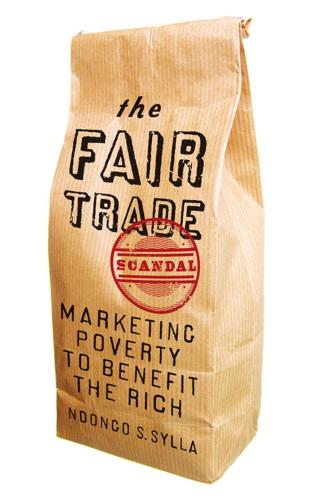
The Fair Trade Scandal: Marketing Poverty to Benefit the Rich
by
Ndongo Sylla
Published 21 Jan 2014
By encouraging countries of the South to export specific goods (those produced in the North mainly), Fair Trade seems to paradoxically contribute to increasing human pressure on the environment. Finally, Fair Trade seems not to encourage relocation of production processes. It encourages producers in the South to promote cash crops at the expense of subsistence crops. This threatens their food sovereignty and slows the adoption of more autonomous modes of living. This strategy also contributes to the depletion of soils under the pressure of productivist agriculture. Conclusion The objections to Fair Trade that I have reviewed are often irreconcilable with one another because they stem from radically opposed doctrinal approaches.
…
If developing countries themselves do not have the means to establish these social safety nets in favour of their populations, it would be unreasonable to expect this from Fair Trade; yet it is worth noting this, if only to demonstrate the limits of its approach. This being said, a second best solution and one that is less demanding could be, for instance, to encourage economic diversification and the achievement of the food sovereignty objective. In the absence of social safety nets, this initiative would at least enable producers and their families to possibly enjoy several sources of income and to reduce their food dependency. In the FT approach, these objectives are considered as secondary. Even though their importance may be recognised, they remain subordinate to the export of products in demand by the market.
…
For countries in this situation, it is crucial in the first instance to facilitate market access and to (re)introduce income stabilisation mechanisms. Beyond this, enhancing agricultural productivity should generally be encouraged for a number of reasons. Through this approach, they would first and foremost ensure food sovereignty and security, especially in countries with dynamic demography. 150 Sylla T02779 01 text 150 28/11/2013 13:04 conclusion This in turn can reduce the cost of food products for populations, alleviate the trade balance and facilitate a channelling of export revenue towards the import of basic intermediate goods.
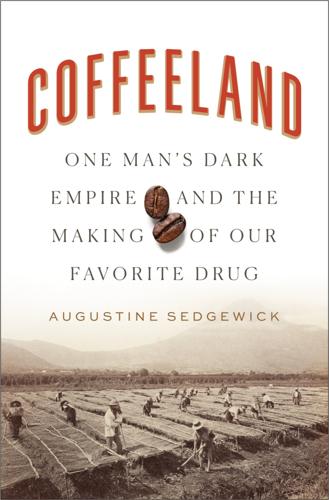
Coffeeland: One Man's Dark Empire and the Making of Our Favorite Drug
by
Augustine Sedgewick
Published 6 Apr 2020
To end “hunger in the coffeelands,” the Specialty Coffee Association of America proposes unmaking monocultures by planting fruit trees for shade above the coffee trees, and cultivating corn and beans in the soil below.54 At the same time, poor and hungry people around the world have come together behind bolder proposals for food security and food sovereignty. Food security, as defined by the UN, “exists when all people, at all times, have physical, social, and economic access to sufficient, safe, and nutritious food which meets their dietary needs and food preferences for an active and healthy life.”55 Food sovereignty, a concept developed by small farmers themselves, goes further, calling not only for a human right to sufficient, varied, and healthy food, but also for the production and distribution of food to be governed locally by the people who eat it.56 Both principles have begun to be translated into new, ethical certifications for coffee that honor instead of exploit basic human needs, and make eating the precondition of working rather than its contingent consequence.
…
Food security, as defined by the UN, “exists when all people, at all times, have physical, social, and economic access to sufficient, safe, and nutritious food which meets their dietary needs and food preferences for an active and healthy life.”55 Food sovereignty, a concept developed by small farmers themselves, goes further, calling not only for a human right to sufficient, varied, and healthy food, but also for the production and distribution of food to be governed locally by the people who eat it.56 Both principles have begun to be translated into new, ethical certifications for coffee that honor instead of exploit basic human needs, and make eating the precondition of working rather than its contingent consequence. There are two ways to think about food sovereignty. One is as a direct rebuke to the core order of the modern world, a way of plowing under the history of globalization, pulling up the root of the international coffee economy, cutting off the principal mechanism of long-distance connection between people who work coffee and people who drink coffee. But the other, more empathetic way, is to think of food sovereignty as a humane proposal for peace: picking wild fruit, tending tomatoes and blackberries, cultivating corn and beans, raising chickens, hunting and fishing, cooking with family, feeding children, sharing with neighbors, welcoming friends, eating anytime, and going back for more, again
…
Reichman, The Broken Village: Coffee, Migration, and Globalization in Honduras (Ithaca, NY: Cornell University Press, 2011); David Griffith et al., “Losing Labor: Coffee, Migration, and Economic Change in Veracruz,” Culture, Agriculture, Food & Environment 39, no. 1 (June 2017): 35–42. 54. “A Blueprint to End Hunger.” 55. Trade Reforms and Food Security: Conceptualizing the Linkages (Rome: Food and Agriculture Organization of the United Nations, 2003), www.fao.org/docrep/005/y4671e/y4671e00.htm# Contents. 56. Hannah Wittman et al., eds., Food Sovereignty: Connecting Food, Nature, and Community (Halifax, NS: Fernwood, 2010). 57. Huston, Families As We Are, 276–78; interview with Jaime Hill, PHP. SELECTED BIBLIOGRAPHY Uncollected Manuscripts Libro de planillas de la Finca de la propiedad de Antonio Flores Torres, 1926–1931, Intercorp, S.V., San Salvador, El Salvador Papers of J.
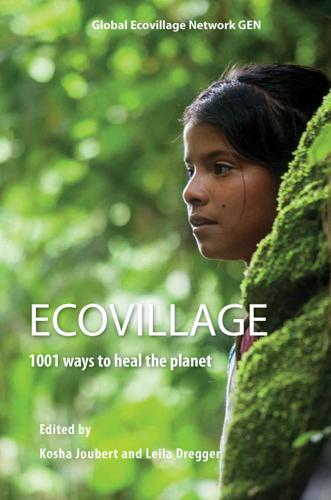
ECOVILLAGE: 1001 ways to heal the planet
by
Ecovillage 1001 Ways to Heal the Planet-Triarchy Press Ltd (2015)
Published 30 Jun 2015
This helped us to understand that we are part of something bigger. Things become clearer when you see your position within a movement. It is like a field of resonance. Today, we have three generations living in Lakabe. We are 100% self-sufficient in energy. In terms of food, we have 80% regional food sovereignty. People come and do trainings and workshops here to learn about this kind of life. We have our own school. Our children show what Lakabe is about. They have a strong sense of social behaviour and are very committed to understanding what is taking place on the planet. We have worked a lot on governance and decision-making and offer workshops throughout Spain to help people set up proper governance in their projects and communities.
…
I also work with challenges and failure; ideas evaporated, projects faded, plans had to be postponed. Yet I cannot be held back. I must look at that what has succeeded and be filled with gratitude, for only then will abundance spread. www.otepic.org Keywords for Solution Library: Earthbag Houses — building cheap and simple shelters Bread from Sweet Potatoes — creating local food sovereignty Portable Gardens — growing food in urban environments solution.ecovillage.org Ubuntu — I Am Because You Are Greening Schools / Zimbabwe, Malawi, Zambia Mugove Walter Nyika, council member of GEN-Africa, was born in Zimbabwe, became a permaculture and ecovillage teacher, moved to Malawi and then, recently, to the Zambia.
…
They can only sell inside Palestine, and as products in such a small country are ripe at the same time, the market is at times flooded with cheap tomatoes, cucumbers or mandarins. Thus, farmers cannot ask a price that pays for their work, especially when they grow organic fruits. By establishing the solar dryers, we created the possibility of preserving fruits and vegetables for the winter, thus strengthening food sovereignty. When we presented this technology people said: “We used to dry our products on the rooftops, but we had to take them down in the evening and put them back up in the morning, and sometimes it rained and then all was ruined.” The solar dryer makes things easy: a plastic sheet tunnel and solar driven fans to take care of the right humidity.
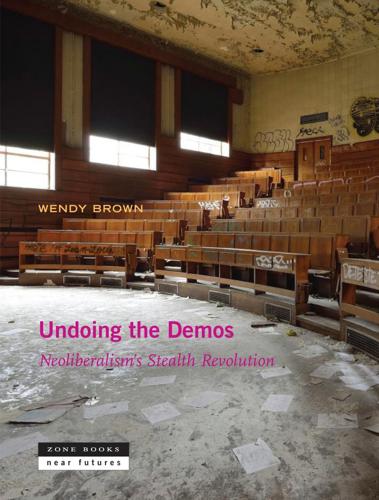
Undoing the Demos: Neoliberalism's Stealth Revolution
by
Wendy Brown
Published 6 Feb 2015
Meanwhile, the aims they replace could include those of educating citizens and developing human beings with those of meeting investor or consumer demand in a university; or those of vitalizing democracy or securing the health of the indigent with those of compressing costs in municipal agencies; or those of producing food sovereignty, war recovery, sustainable resource use or access to the arts with those of branding and competitive positioning for nonprofits and NGOs. Of course best practices are selected and tailored for specific features or challenges of an operation — customer service, employee-driven product innovation, downsizing, management restructuring, outsourcing — but the criterion for a best practice is its help in achieving competitive advantage.
…
Organic, diversified, low-cost, ecologically sustainable wheat production in Iraq is finished.68 Half the free wheat seeds distributed in post-Saddam Iraq were for bread wheat; the other half was for pasta wheat, and pasta is no part of the Iraqi diet.69 Thus, in addition to making Iraqi farmers dependent on giant corporations whose seeds, licensing, and chemicals they must now purchase annually (and for which state subsidies P o l i t i c a l R at i o n a l i t y a n d G o v e rn a n c e 145 are available, while other farm subsidies were eliminated), they were being transformed from multicrop local food providers into monocrop participants in global import-export markets.70 Today, Iraqi farmers generate profits for Monsanto by supplying pasta to Texas school cafeterias, while Iraq has become an importer of staples formerly grown on its own soil. There is more to this heartbreaking story of the destruction of thousands of years of sustainable agriculture and of what some activists call “food sovereignty,” but let us fast-forward to one possible future. A similar experiment took place in India in the 1990s.71 Tens of thousands of farmers were lured into using genetically modified cotton seed by village-to-village agribusiness representatives promising bigger crops with export potential, something especially important at a time when neoliberal reforms were eliminating government price supports and subsidies for cotton production.
…
Thus, while it is certainly possible to imagine more ecologically, economically, and socially sustainable practices for Iraqi agriculture, these would be at odds with global markets and competition, 148 u n d o in g t h e d e m o s intellectual property rights, and new financing conventions, not to mention modernized agricultural techniques. Farming practices that are organic, biodiverse, small scale, cooperative, free of debt financing, and aimed at generating “food sovereignty” for the nation might be sensible from the perspective of how Iraqi wheat production could draw on past knowledge, materials, and techniques for a sustainable future. But insofar as they would make Iraq an outlier in the global economy, they could not qualify as best practices. Also visible in this story is the specific meshing of state and business aims through neoliberal governance, a meshing that exceeds the interlocking directorates or quid pro quo arrangements familiar from past iterations of capitalism.

Bread, Wine, Chocolate: The Slow Loss of Foods We Love
by
Simran Sethi
Published 10 Nov 2015
The loss of agricultural biodiversity and our narrowing global diet are, in part, a reflection of hamburger culture. Fast, processed food is considered modern, easy and cool—sentiments that wind all the way back to the crops that are grown. Phrang Roy, coordinator of the Indigenous Partnership for Agrobiodiversity and Food Sovereignty, saw this surface in the l960s during the rise of industrialized agriculture, which started with the Green Revolution, a period of intensive planting of high-yielding cereal crops that transformed agriculture. “If a farmer grew a multitude of crops, he was not modern, he was backward,” Phrang said.
…
Most of these farmers are women who preserve diversity through “networks of seed and knowledge exchanges.”50 They grow crops that flourish in small areas and nourish local palates, ones that may not ever make it into limited ex situ collections (which, however diverse, can only hold so much). These women are the ones securing the foundation of food sovereignty: the right to decide what to grow and how to grow it—and the right to ultimately decide what to eat.51 Women feed the world. In a story titled “India’s Farming ‘Revolution’ Heading for Collapse,” investigative reporter Daniel Zwerdling explains, “When farmers switched from growing a variety of traditional crops to high-yield wheat and rice, they also had to make other changes.
…
“Wheat,” Agricultural Marketing Resource Center, last modified April 2012, http://www.agmrc.org/commodities__products/grains__oilseeds/wheat/. 48.Borlaug, “The Green Revolution, Peace, and Humanity.” 49.Daniel Zwerdling, “India’s Farming ‘Revolution’ Heading for Collapse,” pt. 1, All Things Considered, NPR, April 13, 2009, http://www.npr.org/templates/story/story.php?storyId=102893816. 50.Chris Arsenault, “Small Farmers Hold the Key to Seed Diversity,” Reuters, February 16, 2015, http://www.reuters.com/article/2015/02/16/us-food-aid-climate-idUSKBN0LK1PO20150216. 51.Ronit Ridberg, “Leading the Fight for Food Sovereignty, An Interview with La Via Campesina’s Dena Hoff,” Nourishing the Planet (blog), Worldwatch Institute, August 9, 2010, http://www.worldwatch.org/node/6514. 52.Daniel Zwerdling, “‘Green Revolution’ Trapping India’s Farmers in Debt,” pt. 2, Morning Edition, NPR, April 14, 2009, http://www.npr.org/templates/story/story.php?
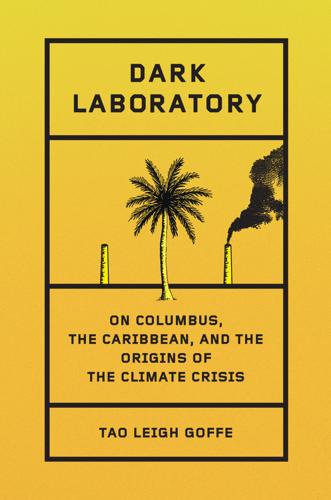
Dark Laboratory: On Columbus, the Caribbean, and the Origins of the Climate Crisis
by
Tao Leigh. Goffe
Published 14 Mar 2025
By stark contrast, the New Jersey Botanical Garden enjoys 96 acres of gardens and 1,000 surrounding woodlands of the Ramapo Mountains nearby in the same township, Ringwood. On their unceded territories, the Ramapough Lunaape Turtle Clan established the Munsee Three Sisters Medicinal Farms for botanical healing, CBD, and food sovereignty in 2019, which we will explore in further detail in chapter 8. * * * Shifting from New Jersey’s mountains to the Caribbean and my ancestral mountain ballads: for a long time, I could not hear these songs. Being British and becoming American, my ancestral homelands were abstract and romantic ideas.
…
In 1793, William Bligh took samples of the ackee fruit to Kew Gardens, the metropolis and heart of the operation, continuing the island laboratory experimentation of British empire. In doing so, he transformed the Jamaican microbiome and the gastronomy of the islands. Is there a way for Tahitians and Jamaicans to commune on this colonial history? Together, could we build a plan for future food sovereignty and nourishment for islands that would enrich the diets and livelihood of Black and Indigenous peoples? Commerce, Criminalization, Climate, and Legalization The gradual strides in the legalization of marijuana are opening potential botanical and economic pathways for climate repair.
…
For those who have pursued Bureau of Indian Affairs (BIA) recognition successfully, the path forward is cultivation; however, it puts them at risk with the law and subject to more surveillance. In Jamaica, too, state power is tested by the burgeoning recreational and medicinal marijuana trade. In New Jersey, the Munsee Three Sisters Medicinal Farm is one example of a federally recognized Native tribe going into business for themselves as part of their mission of food sovereignty. Their lands are not far from the pristine and protected New Jersey Botanical Garden, with their manicured lawns, in nearby Ringwood. The Munsee Three Sisters Medicinal Farm was founded in 2019 as the vision of Chief Vincent Mann and Michaeline Picaro, who work to heal the members of the Turtle Clan who suffer the long-term carcinogenic effects of the Superfund site known as Ringwood Mines, on which their tribal land sits.[24] They cultivate local produce and sell smokeable flowers, CBD, edibles, pipes, Native crafts, incense, sage, sweetgrass, and botanical bundles.
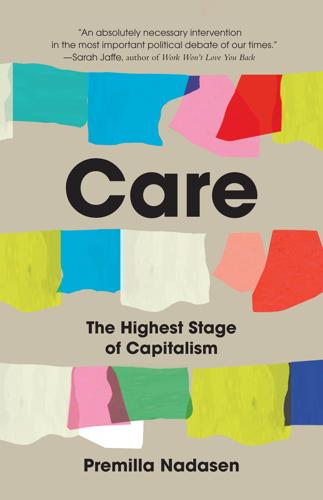
Care: The Highest Stage of Capitalism
by
Premilla Nadasen
Published 10 Oct 2023
As organizers Dara Cooper and Ashanté Reese write in their beautifully titled article, “Making Spaces Something Like Freedom,” Black food justice looks beyond “carceral and destructive food systems to new imaginaries of freedom, nourishment, sustainability, and affirmations of Black dignity and humanity.”33 Cooper has deep roots in environmental justice and community organizing across the US, with a particular focus on the Black farmers in the South who are leading the regenerative agriculture movement. She is a cofounder of and strategic advisor with the National Black Food and Justice Alliance, working toward both Black food sovereignty and land justice. She is also a cofounder of Health Environment Agriculture and Labor (HEAL) Food Alliance, a multiracial, multisectoral alliance that addresses workers’ rights, land, and the intersections of the prison-industrial complex and the food system. For Cooper, food sovereignty is tied to intersectional movement building and is anticorporate, collective, sustainable, and self-determining. The Black food justice movement has distributed money, offered support to Black food and land projects around the country, and initiated experiments in collective, community-controlled models of land stewardship.

Hunger: The Oldest Problem
by
Martin Caparros
Published 14 Jan 2020
It offers a strategy to resist and dismantle the current corporate trade and food regime, and directions for food, farming, pastoral and fisheries systems determined by local producers. Food sovereignty prioritizes local and national economies and markets and empowers peasant and family farmer-driven agriculture, artisanal fishing, pastoralist-led grazing, and food production, distribution, and consumption based on environmental, social, and economic sustainability. Food sovereignty promotes transparent trade that guarantees just income to all peoples and the rights of consumers to control their food and nutrition. It ensures that the rights to use and manage our lands, territories, waters, seeds, livestock, and biodiversity are in the hands of those of us who produce food.
…
And if that 1 percent gives, all the better: see how good they are, they who produce wealth for all? Against the idea of food security understood as the guarantee that everybody will receive—receive being the key word here—enough food, an international organization, La Vía Campesina coined the idea of food sovereignty. In their Declaration of Nyéléni in Mali in 2007, they defined this as, “the right of peoples to healthy and culturally appropriate food produced through ecologically sound and sustainable methods, and their right to define their own food and agriculture systems. It puts those who produce, distribute and consume food at the heart of food systems and policies rather than the demands of markets and corporations.
…
It ensures that the rights to use and manage our lands, territories, waters, seeds, livestock, and biodiversity are in the hands of those of us who produce food. Food sovereignty implies new social relations free of oppression and inequality between men and women, peoples, racial groups, social classes, and generations.”20 What would happen if we all ate, if nobody died of hunger? Would it then be fair that some had billions and others just enough to eat. It’s not going to happen anytime soon, but if hunger one day ends, we should think through a few of these things. SOUTH SUDAN: DEVELOPMENTS OF HUNGER 1 NEW COUNTRY.
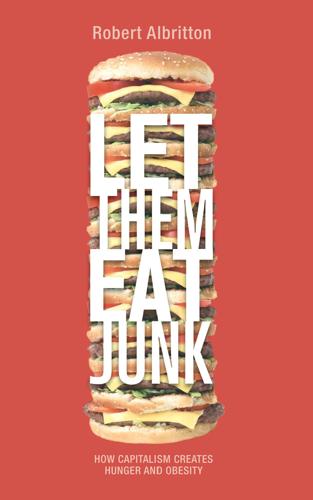
Let them eat junk: how capitalism creates hunger and obesity
by
Robert Albritton
Published 31 Mar 2009
Since the draconian structural adjustment policies increasingly imposed on developing countries from the 1980s, movements of self-protection against big capital’s tendency to drive people from the land and to leave them hungry have been particularly important. Now they are even more necessary as food 204 L E T T H E M E AT J U N K prices rise globally, and this is why Via Campesina and the Brazilian Landless Workers Movement have been so successful. Via Campesina’s call for “food sovereignty” is essentially an effort to find ways of insulating the rural poor from the rapaciousness of global capitalism by rebuilding healthy rural communities that are, at least to some degree, self-sufficient. At the same time, given the violent and exploitative history of colonialism and imperialism, and the devastation that this history has caused throughout the global South, it is also necessary to think about longer-term means to significantly redistribute wealth on a global scale – a redistribution that will only become possible and effective to the extent that international cooperation is far more advanced than it is today.
…
Coli 115 ecology 6–7, 24, 148, 161, 219 see also environment Ecuador 138 election campaigns (US) 185–6 El Salvador 159 empty calories 3, 5, 94 see also junk food enclosures of commons 12, 21 England 31, 44, 54 environment 152, 146–65 environmental costs 61, 148, 183 environmental debt 147 environmental degradation 61, 147, 151 environmental regulations 45 see also ecology Environmental Protection Agency (EPA) 137, 151, 159, 192 equality x, 197 see also inequality erosion 157 ethanol 5, 15, 23, 107, 135, 147, 150–2, 154, 189, 212 Everglades 45, 100–1, 171, 216 exercise 104 export-oriented agriculture 125, 134–6, 141 externalities xii, 28, 208 see also social costs extinction 156 extreme weather 35, 153, 156, 158 F Factory Acts 31 factory farms 19, 29, 36, 150, 157 see also agriculture fair trade 204 254 INDEX family farms 8, 18, 19, 25, 42, 45, 49, 59, 69, 82, 83, 120, 123, 128–30, 138, 140–1, 144, 203 see also agriculture farm income 128–30 fashion 69 fast food 32, 92, 97–8, 109, 120 fast food chains 133, 120–2 feedlots 103 see also confined animal feeding operation (CAFO) field workers 126–8 Fiji Islands 176 fish 160 flourishing 6 food 10 food additives 63, 113 food aid 108 food crisis ix, x, 89 food disparagement laws 189 food inspection 112, 189 food prices ix, 5, 23, 41, 88, 108, 129, 135, 141–2, 150, 152, 187, 204 see also hunger, starvation, structural adjustment policies, subsidies food provisioning 164 food pyramid 188 food regime/system 6 food safety 189 food security 153 see also food prices, hunger, starvation, structural adjustment policies, subsidies food sovereignty 204 Food and Agriculture Organization (FAO) ix, 89, 97, 153, 188 forced labour 124, 127 see also slavery fossil fuel 148, 151, 155 see also coal, petroleum Framework Convention on Tobacco Control 187 Frank Statement 191–2 freedom 47, 189 see also rights French revolution 2 G General Marshall 182 General Pershing 182 genetically modified organisms (GMOs) 118–19, 147, 161–3, 193 Bt crops 162 Roundup ready crops 162 global warming xi, 4, 5, 35, 147, 150, 154–6, 159, 179, 218 globalization 43–6, 71 glyposate 118–19 see also Roundup golden age 13, 52, 53 Gore, Al 100 government 183 government regulation 168, 193, 206 grain crops 155 green house gas emissions 142, 146, 148, 151, 155, 157 Greenland ice sheet 154 green revolution 58, 61, 115, 118, 124, 135, 149 green tobacco sickness 220 group of eight xii guaranteed annual income 35, 205, 210 guest workers 127, 140 H Haber–Bosch process 57 Haiti 128 Hammer, Armand 63 health 6, 16, 81, 92–4, 144, 174, 190–1, 210 high blood pressure 109 high fructose corn syrup (HFCS) 96, 101 historical analysis 13 historical directionality 12 homogenization 24, 33–7, 66 see also monoculture, species loss human flourishing 213 INDEX human rights 132 human right to food 197 see also rights Human Rights Watch 131, 138–9 hunger 4, 80, 89, 91, 105–8, 158, 204 see also starvation I identity 6, 10 island identity 46–7 see also subjectivity, individualism, possessive individualism ideology 74–5, 168, 182, 196 see also capitalist ideology illegal drugs 141 immigrant labour 40, 124, 126 see also guest workers, undocumented workers India 142 Indian Ocean 158 indifference to use-value 28, 29, 77 see also quality versus quantity individualism 26, 73–4, 166, 168, 170, 179 Indonesia 142, 155 industrial reserve army 39 inelasticity 24 inequality 8, 72, 134, 152, 180, 184, 194, 213 see also equality, poverty, poverty line, wages inner logic 12 see also abstract theory, deep structure/cause, pure capitalism intensification 30, 131 see also speed international cooperation 204, 207, 211 see also movements International Monetary Fund (IMF) 134 invisible hand 11 irrationality x, xi, 6, 29, 195, 202, 207 see also contradiction, rationality irrigation 157 255 Ivory Coast 138, 202 J jobs 126 job security 125–6 job turnover 131, 133 Joe Camel 171 Johnson, President L.
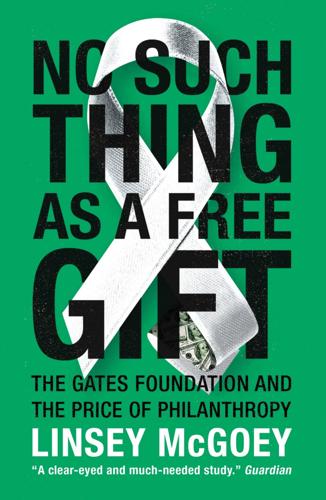
No Such Thing as a Free Gift: The Gates Foundation and the Price of Philanthropy
by
Linsey McGoey
Published 14 Apr 2015
As Stuckler and his colleagues have asked, when a philanthropic foundation that is heavily invested in Coca-Cola chooses to set up a charitable initiative that enlists poor farmers in cultivating fruit for Coca-Cola, the question is – does this still count as philanthropy? And if not, then why should the Gates Foundation continue to receive the generous tax exemptions it currently enjoys?42 TAMING THE DONORS In 2014, the Alliance for Food Sovereignty in Africa (AFSA), a pan-African platform composed of different farmers organizations throughout the continent, submitted an ‘open letter’ to the Gates Foundation and Iowa State University expressing concern over human feeding trials of GM bananas taking place at the university. The results of the trials were aimed at supporting the release of GM bananas into Ugandan farming and food systems although Uganda has resisted efforts to increase the use of GM crops in the nation.
…
Ball, discovered that Noonan – Tressell’s name while alive – was itself an earlier pseudonym. He was likely born Robert Croker. I refer to him as Noonan as it was his chosen name. Index Africa: and African markets, 216–9, 222; agricultural challenges in, 216–7, 221–2; and Alliance for a Green Revolution in Africa, 217, 218; and the Alliance for Food Sovereignty in Africa, 228; and Coca-Cola, 222–3; and diseases, 190–1, 223–4; economic infrastructures in, 39, 170–1; and genetically modified maize, 218–9; Ghana, 1–3, 5, 21, 150, 170–1; and Monsanto, 206, 216–9, 221–2; and M-PESA bill-pay system, 81–2; Uganda, 14, 219, 228; and World Food Programme’s Purchase for Progress, 208; and World Health Organization, 226 African Americans: and education, 10, 54; and schools established by Rosenwald, 118; as source of labour for industrialists, 46–7; and students’ gap in test scores, 138; and voting rights, 45 Allen, Paul, 181–3 altruism, 48, 90, 146 American Legislative Exchange Council, 131–2, 200 Apotex, 103–4 Apple, 143, 246 Argentina, 188–9 Ashoka, 66, 68, 72 Asia: and Coca-Cola, 222–3; and World Food Programme’s Purchase for Progress, 208; and World Health Organization, 226 Balsillie, Jim, 106–7, 245 Band, Doug, 29–32 Barefoot College, 67, 68 Barkan, Joanne, 128, 139, 140, 144 Bastiat, Frédéric, 198, 200 Baudelaire, Charles, 12–13, 14 Berkshire Hathaway, 8, 173–4, 215 Bishop, Matthew, 6, 7, 8, 111 Bloomberg, Michael, 127–8 Boldrin, Michele, 199–200 Bourdieu, Pierre, 19–20, 65 Brazil, 17, 96, 221 Broad Foundation, 9, 122, 139 Buffett, Howard, 216, 221 Buffett, Warren: and Berkshire Hathaway, 173, 216; and Coca-Cola, 173, 222; as a donor to African farming programmes, 216; and Gates Foundation, 8, 173, 174; and the Giving Pledge, 24, 117; and Goldman Sachs, 215; and philanthropy, 24, 26, 146 Bush, George H.
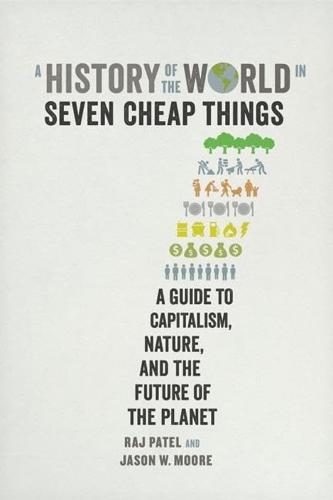
A History of the World in Seven Cheap Things: A Guide to Capitalism, Nature, and the Future of the Planet
by
Raj Patel
and
Jason W. Moore
Published 16 Oct 2017
Gramsci, Antonio. 1978. Selections from Political Writings (1921–1926). Edited and translated by Quintin Hoare. New York: International. Grantham, J. 2011. “Days of Abundant Resources and Falling Prices Are Over Forever.” GMO Quarterly Newsletter, April, 1–18. Grey, Sam, and Raj Patel. 2014. “Food Sovereignty as Decolonization: Some Contributions from Indigenous Movements to Food System and Development Politics.” Agriculture and Human Values 32, no. 3: 431–44. Grosfoguel, Ramón, and Eric Mielants. 2006. “The Long-Durée Entanglement between Islamophobia and Racism in the Modern/Colonial Capitalist/Patriarchal World-System: An Introduction.”
…
“Renaissance Maps and the Construction of the Idea of Europe.” Journal of Historical Geography 25, no. 2: 137–65. Wish, Harvey. 1937. “American Slave Insurrections before 1861.” Journal of Negro History 22, no. 3: 299–320. Wittman, Hannah. 2009. “Reworking the Metabolic Rift: La Vía Campesina, Agrarian Citizenship, and Food Sovereignty.” Journal of Peasant Studies 36, no. 4: 805–26. Wolf, Eric R. 1982. Europe and the People without History. Berkeley: University of California Press. Wood, Andy. 2007. The 1549 Rebellions and the Making of Early Modern England. Cambridge: Cambridge University Press. Wood, Ellen Meiksins. 2003.
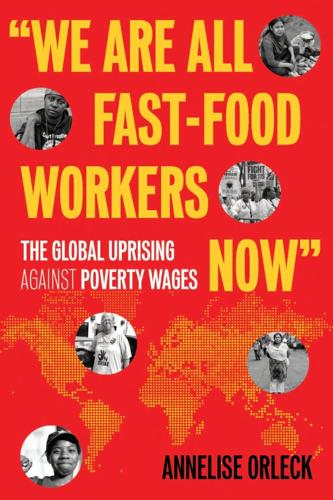
We Are All Fast-Food Workers Now: The Global Uprising Against Poverty Wages
by
Annelise Orleck
Published 27 Feb 2018
They have a business of their own.” Through the heirloom rice business, indigenous Cordillera women have become political advocates for their communities, says Hensley. They travel through Asia and Europe, connecting with other farmers and slow-food activists. They have become part of the global fight for “food sovereignty.” Each country’s citizens should control local food supplies, policies, and growing practices, they argue, not global seed and chemical companies. Garcia’s remarkable energy helped spark a little revolution in the Cordillera, says Hensley. “I can still see her in my mind, visiting a hundred little communities, finding ways to speak to farmers in their own languages (which are different in every town).
…
The food-chain bill is potentially transformative, they say. One in six US workers labor in food-chain jobs. So do millions more worldwide. Food First director Eric Holt-Giménez and Berkeley professor Miguel Altieri see similar kinds of coalitions being formed worldwide as “agroecologists build strategic alliances with food sovereignty and agrarian movements.” These alliances, they believe, are creating “considerable political will for the transformation of our food systems.” As Via Campesina argues, the future of our world and its creatures may depend on their success.17 Cotton farming is being transformed as well. And, once again, global worker protest and consumer pressure have catalyzed change.
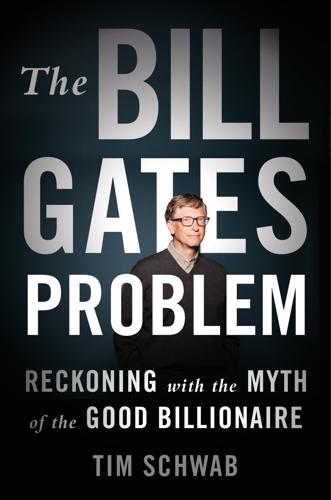
The Bill Gates Problem: Reckoning With the Myth of the Good Billionaire
by
Tim Schwab
Published 13 Nov 2023
Likewise, we haven’t seen the major decreases in hunger or increases in crop yields and farmers’ incomes that Bill Gates promised his agricultural agenda would deliver. The failures, however, don’t mean the Gates Foundation isn’t having an impact. “In so many ways, they are very much successful because they sold a narrative,” Million Belay, head of the Alliance for Food Sovereignty in Africa, told me in an interview. “The narrative is African seeds are tired. The land of Africans is not fertile. The knowledge that Africans have is archaic. In order to produce more food, you need hybrid variety seeds. The soil is very tired, so you have to target it with lots of chemicals.
…
This level of dependency and Bill Gates’s top-down political maneuvering have proven controversial among the farmers Gates claims to help, and in 2021 and 2022, the pushback reached new levels of visibility, notably including a high-profile op-ed in Scientific American titled “Bill Gates Should Stop Telling Africans What Kind of Agriculture Africans Need.” The piece was written by Million Belay and Bridget Mugambe of the Alliance for Food Sovereignty in Africa, the largest civil society organization in all of Africa, representing two hundred million farmers, fishers, pastoralists, and indigenous peoples across the continent. We welcome investment in agriculture on our continent, but we seek it in a form that is democratic and responsive to the people at the heart of agriculture, not as a top-down force that ends up concentrating power and profit into the hands of a small number of multinational companies.
…
Abbott Laboratories ABC Abimbola, Seye AccessIBSA Achieve Acosta, Alex ACT Adeyi, Olusoji Aeras Affinivax Affleck, Ben Afghanistan Africa Africa Harvest Biotech Foundation International African Agricultural Technology Foundation African Centre for Biosafety African Fertilizer and Agribusiness Partnership African Leaders Malaria Alliance African Union Aga Khan University (AKU) Agricultural Transformation Agency (ATA) agriculture agrochemicals agroecology Air America Alexander, Ashok Alicia Patterson Foundation Al Jazeera Allen, David Allen, Paul Alliance for a Green Revolution in Africa (AGRA) Alliance for Food Sovereignty in Africa Alliance for Science Altair computer Amazon Ambani, Mukesh American Association of University Professors American Enterprise Institute American Federation of Teachers American Foundations (Dowie) American Legislative Exchange Council (ALEC) American Public Media America Online Anacor Pharmaceuticals Andrew, Prince Angell, Marcia Angelou, Maya Angola Aniston, Jennifer Annan, Kofi antibiotics antitrust Apollo Global Management Apple computers Appraising Microsoft Arjuna Capital Armstrong, Lance Arthun, Erika Asahi Shimbun Aspen Institute New Voices Fellowship Associated Press AstraZeneca Atlantic Atuire, Caesar A.

As Gods: A Moral History of the Genetic Age
by
Matthew Cobb
Published 15 Nov 2022
The Lancet, which eventually published Pusztai’s weak research, boasted that ‘a debate about the science, rather than unsupported claims about that science, has now begun’.20 But there was no debate, just conflict. This image was used by anti-GM campaigners in Canada with the slogans ‘Defend Food Sovereignty’ and ‘BAN Terminator Seeds’. Pusztai’s study involved only six rats in each experimental group and failed to properly control for the nutritional content of the GM potatoes – the rats may simply have been undernourished. The response of the scientific establishment to this piece of shoddy science was heavy-handed – the outcome of the Royal Society’s investigation looked like it had been decided in advance, while Pusztai was suspended by his employer and his work was ‘audited’.
…
DARPA’s budget allocations are opaque; a year earlier the $100 million figure was quoted as covering DARPA’s whole synthetic biology budget – see Garthwaite (2016). 60 Common Call for a Global Moratorium on Genetically-Engineered Gene Drives. https://www.synbiowatch.org/gene-drives/gene-drives-moratorium/ 61 ETC Group and Heinrich Böll Stiftung (2018), Forcing the Farm: How Gene Drive Organisms Could Entrench Industrial Agriculture and Threaten Food Sovereignty. https://www.etcgroup.org/content/forcing-farm 62 New York Times Magazine, 8 January 2020. 63 World Health Organization (2021), Guidance Framework for Testing Genetically Modified Mosquitoes (Geneva, WHO). 64 Meghani, Z. and Kuzma, J. (2017), Journal of Responsible Innovation 5:S203–22; Waltz, E. (2022), Nature 604:608–9. 65 Connolly, J., et al. (2021), Malaria Journal 20:170. 66 Le Monde, 4 July 2019. 67 Le Monde, 29 June 2018. 68 Libération, 18 November 2018. 69 Daily Telegraph, 8 October 2019. 70 New York Times Magazine, 8 January 2020. 71 The Guardian, 18 November 2019. 72 Barry, N., et al. (2020), Malaria Journal 19:199, p. 5. 73 Daily Telegraph, 8 October 2019; Le Monde, 29 June 2018. 74 Le Monde, 4 July 2019. 75 Moloo, Z. (2018), Project Syndicate, December 2018. https://www.project-syndicate.org/commentary/target-malaria-gene-drive-experiments-lack-of-consent-by-zahra-moloo-2018-12.

Global Financial Crisis
by
Noah Berlatsky
Published 19 Feb 2010
In the search for an alternative paradigm, Africa should revisit key documents, such as the Lagos Plan of Action (LPA), the African Alternative Framework to SAPs (AAF-SAPs), the Arusha Declaration on popular participation, and the Abuja Treaty, among others. An update of these documents and the integration of contributions made by the struggles of civil society organisations in the areas of gender equality, trade, finance, food sovereignty, human and social rights should help Africa come up with its own development paradigm. Africa and Africans should reclaim the debate on their development. Is it necessary to stress again that Africa’s regional and continental integration is one of the keys to its survival and long-term development?

Meat: A Benign Extravagance
by
Simon Fairlie
Published 14 Jun 2010
It can be done through selling bags of subsidized compost, but at the current price of £10 for a 25 kilo sack, organic pig-feed justifies the transport a lot more than organic compost. The return of the backyard pig will not only sort out our food waste problems more importantly it will enhance the cultural life of the nation. The pig has always been a mainstay of the poor family’s independence and of a community’s food sovereignty. ‘Pigs for health’ was an English expression; ‘the pig pays the rent’ an Irish one. It is because of the centrality of the pig to the security and the aspirations of settled peasants – be they Papuan tribesmen, the labourers of Larkrise, or the negroes of Maryland – that its life, its death and its afterlife are invariably imbued with ritual or religious significance.34 ‘Stand by your Ham’ is a call that resonates more fully amongst a proud and independent peasantry than a bunch of whingeing factory farmers, some of whom have probably never cured a ham in their lives.
…
Table 5: The World’s Two Marine Fishing Industries – How They Compare Credit: David Thompson/FAO The one matter that Thomson’s chart doesn’t show is who eats the fish. One can be reasonably confident that fish caught by the small scale sector are feeding local people (though not necessarily all local people) and contributing to a region’s food sovereignty. The global fleet of factory trawlers, on the other hand, is an engine for hoovering up protein in certain parts of the world and ferrying it to consumers thousands of miles away who have the wherewithal to pay for it. And the flow of protein is from the waters of people who need it to the tables of people who don’t.
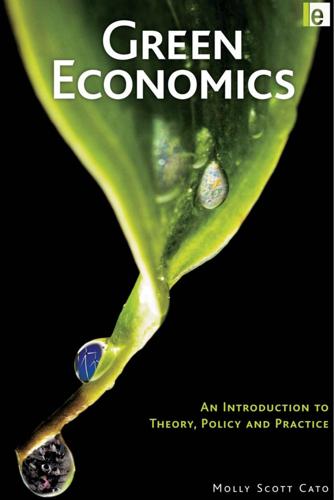
Green Economics: An Introduction to Theory, Policy and Practice
by
Molly Scott Cato
Published 16 Dec 2008
His salt marches and campaign for homespun cloth or khadi (the origin of the spinning wheel on India’s national flag) were designed to achieve not just national independence but local and personal independence too: GLOBALIZATION AND TRADE 133 BOX 8.2 THE FIGHT-BACK: TRADE-RELATED DIRECT ACTION IN INDIA • • • • • • Shut-down of a Coca-Cola plant in Plachimada, Kerala by local tribal women; the company had been exploiting the valuable local water resource to the extent of 1.5 million litres a day; blockades of 87 Coca-Cola and Pepsi plants nationwide inspired by the Plachimada example; students at Jawaharlal Nehru University voted to replace their campus Nestlé outlet with a café serving indigenous cuisine from the northeast tribal region of India Seed Sovereignty: a nationwide movement encouraging non-cooperation with seed patent laws; development of sufficiency agriculture policies around the slogan – Food Sovereignty, Seed Sovereignty, Water Sovereignty; creation by communities of ‘freedom zones’ protected from GM seeds, pesticides, unfair practices by corporations and monopolistic markets. Source: C. Lucas, V. Shiva and C. Hines (2005) ‘Making poverty inevitable: The consequence of the UK government’s damaging approach to global trade’, download available from Caroline Lucas’ website: www.carolinelucasmep.org.uk.

American Marxism
by
Mark R. Levin
Published 12 Jul 2021
The declaration continues: We propose the following actions to change the system: Transformation of the power relations and the decision-making systems for the construction of an anti-patriarchal people’s power. Transformation of food production systems into agro-ecological systems, thus ensuring food sovereignty and security and valuing knowledge, innovations, ancestral and traditional practices. Transformation of the energy production systems, eradicating dirty energies respecting the right of the peoples to fight poverty and keeping fair transition as a guiding principle. Transformation of the energy consumption patterns through education, regulations to large energy consumers and empowerment of the people over community-scaled systems of renewable energies production under control of the communities.
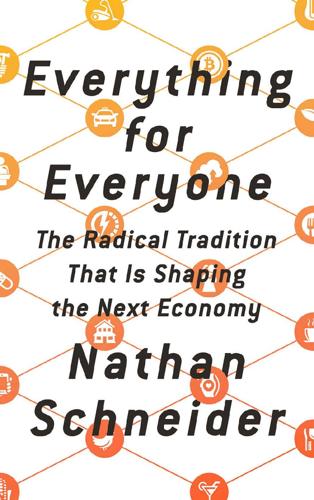
Everything for Everyone: The Radical Tradition That Is Shaping the Next Economy
by
Nathan Schneider
Published 10 Sep 2018
Martin Luther King Jr. tried to set up credit unions during the Montgomery Bus Boycott and at his church in Atlanta—efforts that faced resistance from federal regulators. After years of agitating for voting rights, Fannie Lou Hamer organized the Freedom Farm, a cooperative meant to secure the gains of civil rights with food sovereignty. When Student Nonviolent Coordinating Committee members agitated for voting rights in Jackson, they also helped create cooperatives; later, black churches kept up the work by building bulwark institutions such as the Hope Credit Union.29 Cooperation has bound survival and resistance together.
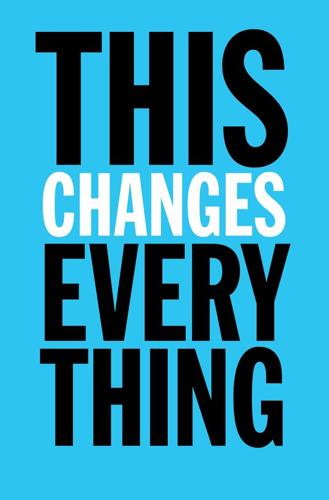
This Changes Everything: Capitalism vs. The Climate
by
Naomi Klein
Published 15 Sep 2014
After all, the U.S. has more food than it knows what to do with, and still 50 million people are food insecure.”28 And he adds, “The tragedy here is that there are thousands of successful experiments, worldwide, showing how climate-smart agriculture can work. They’re characterized not by expensive fertilizer from Yara and proprietary seeds from Monsanto, but knowledge developed and shared by peasants freely and equitably.” And, Patel says, “In its finest moments, agroecology gets combined with ‘food sovereignty,’ with democratic control of the food system, so that not only is more food produced, but it’s distributed so that everyone gets to eat it too.”29 About That German Miracle . . . We now have a few models to point to that demonstrate how to get far-reaching decentralized climate solutions off the ground with remarkable speed, while fighting poverty, hunger, and joblessness at the same time.
…
In fact the slogan long embraced by this movement has been “System Change, Not Climate Change”—a recognition that these are the two choices we face.67 “The climate justice fight here in the U.S. and around the world is not just a fight against the [biggest] ecological crisis of all time,” Miya Yoshitani, executive director of the Oakland-based Asian Pacific Environmental Network (APEN), explains. “It is the fight for a new economy, a new energy system, a new democracy, a new relationship to the planet and to each other, for land, water, and food sovereignty, for Indigenous rights, for human rights and dignity for all people. When climate justice wins we win the world that we want. We can’t sit this one out, not because we have too much to lose but because we have too much to gain. . . . We are bound together in this battle, not just for a reduction in the parts per million of CO2, but to transform our economies and rebuild a world that we want today.”68 This is what many liberal commentators get wrong when they assume that climate action is futile because it asks us to sacrifice in the name of far-off benefits.
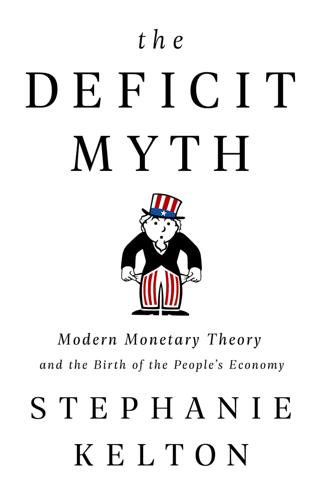
The Deficit Myth: Modern Monetary Theory and the Birth of the People's Economy
by
Stephanie Kelton
Published 8 Jun 2020
Meanwhile, as Fadhel Kaboub recommends, South-South trade partnerships could help developing countries grow complementary industries and escape their current position in the global production chain, where they’re stuck importing high-value finished goods and exporting cheaper intermediate goods. Otherwise, we will need a system that transfers these productive resources and technological know-how from the developed world to the developing one.39 That would deliver poorer parts of the world the industrial capacity they need to build up their (renewable) energy and (sustainable) food sovereignty—and thus escape the trap we discussed earlier of being dependent on imports to access critical resources. In theory and practice, lack of food and energy sovereignty are solvable problems. Even major food importing countries with mostly desert climates can adopt a sustainable agriculture program by investing in more water efficient hydroponic and aquaponics food production.
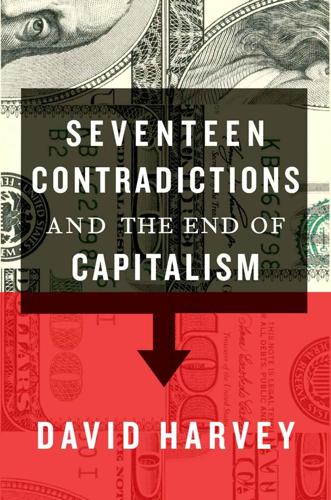
Seventeen Contradictions and the End of Capitalism
by
David Harvey
Published 3 Apr 2014
The last great famine in China, which may have killed some 20 million people at the time of the ‘great leap forward’, occurred precisely because China was then by political choice isolated from the world market. Such an event could not now happen in China. This should be a salutary lesson for all those who place their anti-capitalist faith on the prospects for local food sovereignty, local self-sufficiency and decoupling from the global economy. Freeing ourselves from the chains of an international division of labour organised for the benefit of capital and the imperialist powers is one thing, but decoupling from the world market in the name of anti-globalisation is a potentially suicidal alternative.

Border and Rule: Global Migration, Capitalism, and the Rise of Racist Nationalism
by
Harsha Walia
Published 9 Feb 2021
The wage gap between jobs in the US and Mexico widened, and real Mexican wages grew by just 2.3 percent.49 Fifty-five million Mexicans lived below the poverty line, with women experiencing the highest loss of real earnings.50 The number of people in primary subsistence economies such as agriculture, fishing, and forestry fell from 8.2 million in 1991 to 6.1 million in 2006.51 US corn exports, on the other hand, increased by 323 percent within NAFTA’s first decade, and by 2016, 65 percent of corn was being imported.52 The rhetoric of free trade masked deeply unfair trade practices. NAFTA removed Mexican tariffs on subsidized US meat and agricultural exports, flooding the market with genetically modified cash crops like corn, which impoverished local farmers and threatened Indigenous food sovereignty. Maize is sacred in Indigenous communities; as Aldo Gonzalez describes, “Native seeds are a very important part of our culture. The pyramids may have been destroyed, but a handful of maize seed is the legacy we can leave to our children and grandchildren.”53 The decimation of thousands of varieties of native corn is a form of gendered genocidal violence, disproportionately impacting Indigenous matriarchal cultures and the livelihoods of Indigenous women harvesters.
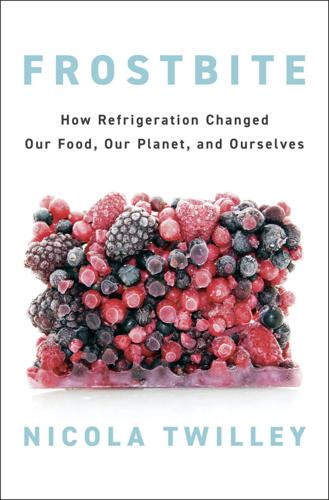
Frostbite: How Refrigeration Changed Our Food, Our Planet, and Ourselves
by
Nicola Twilley
Published 24 Jun 2024
New York Times, March 13, 2018; Biing-Hwan Lin and Rosanna Mentzer Morrison, “A Closer Look at Declining Fruit and Vegetable Consumption Using Linked Data Sources,” Amber Waves, July 5, 2016; Cheryl Schweizer, “Washington Apple Growers Facing Some Exporting Challenges,” KREM2, January 17, 2023; Joseph Leitmann-Santa Cruz and Ambassador Robert Pastorino, “Accession of Chile to NAFTA: Benefits for Chile and the United States,” Institute for Agriculture & Trade Policy, May 14, 2000; M. Jahi Chappell et al., “Food Sovereignty: An Alternative Paradigm for Poverty Reduction and Biodiversity Conservation in Latin America,” F1000 Research 2 (November 2013); Peter Williams and Warwick E. Murray, “Behind the ‘Miracle’: Non-traditional Agro-Exports and Water Stress in Marginalised Areas of Ica, Peru,” Bulletin of Latin American Research (2018); Ayesha Tandon, “ ‘Food Miles’ Have Larger Climate Impact Than Thought, Study Suggests,” CarbonBrief, June 20, 2022; Molly Leavens, “Do Food Miles Really Matter?”
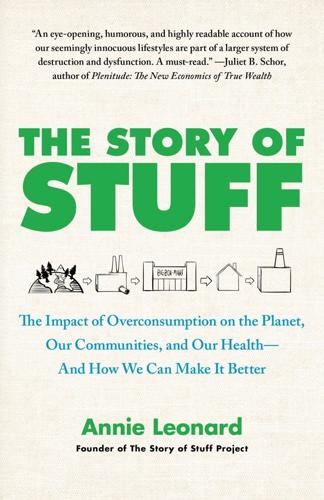
The Story of Stuff: The Impact of Overconsumption on the Planet, Our Communities, and Our Health-And How We Can Make It Better
by
Annie Leonard
Published 22 Feb 2011
In 2005, the Indian Coordination Committee of Farmers Movements, a coalition of farmers from around the country, wrote a letter to the prime minister summarizing their demands in the face of the emergency: “The dumping of these agricultural commodities led to depression in the domestic farmgate prices, which led to a deep agrarian crisis and caused increased cases of farmers’ suicides... We believe that the very structure of WTO rules therefore distorts trade against small farmers, against food sovereignty and against trade justice. That is why we gave a call for the removal of agriculture from WTO... Agriculture in India is not an industry. It is the main source of livelihood for 70% of the population of the country. We therefore demand from the Indian government to quit from WTO. We also demand that agriculture should be out of WTO.”119 As I finalize this book in late 2009, farmers throughout India are continuing to fight with increasing desperation to protect their livelihoods and save their economy from being the latest casualty of the WTO.
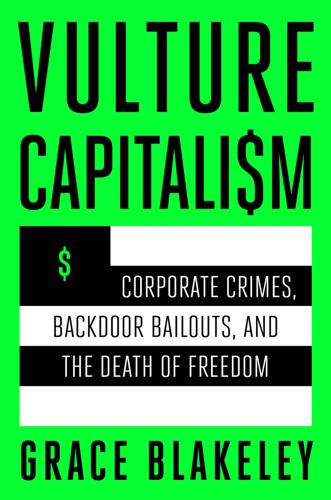
Vulture Capitalism: Corporate Crimes, Backdoor Bailouts, and the Death of Freedom
by
Grace Blakeley
Published 11 Mar 2024
Akuno and his comrades started out by setting up a network of people’s assemblies that would feed into a People’s Task Force, which would initiate the proposals decided on by the assemblies.105 In 2009, the group helped elect Chokwe Lumumba to the local council, as well as leading successful campaigns to elect the first-ever Black sheriff of Hinds County, to resist cuts to the public transport budget, and pass antiracist legislation in the city.106 In 2017, Chokwe Antar Lumumba—Lumumba’s son—stood as the Democratic Party’s candidate for mayor of Jackson and won with 90 percent of the vote.107 The final pillar of the Jackson-Kush Plan—building a solidarity economy—relied on the construction of cooperative and community organizations from the ground up.108 Akuno’s vision included plans for housing cooperatives, credit unions, urban farms, agricultural cooperatives, land conservation trusts, and an expansion of public services. The organization occupied unused land to start a network of urban farms and farmers’ markets, which worked together to “promote a healthy diet, affordable produce, and food sovereignty in the city.” It also developed a campaign to expand worker organizing in the city with the aim of overturning anti-union legislation. Since then, the city’s co-op networks have blossomed. The Freedom Farms Cooperative grows and sells fresh produce in the local area; the Green Team Landscaping Co-op provides lawn services to clients and the organizations within the co-op network; and the Community Production Cooperative hosts skills training and events for members and residents, as well as supporting local artists.

Hawaii Travel Guide
by
Lonely Planet
By year's end state revenue shortfalls soared to nearly $2 billion and then-governor Linda Lingle imposed extremely harsh budget cuts, including furloughs for state employees and shortened schedules for public schools. Since 2011 Hawaii's economy has rebounded. In terms of statistical measures like unemployment and outstanding debt, Hawaii is now in better shape than some US mainland states that have long been economic powerhouses. The state's push toward energy independence and food security (aka 'food sovereignty') includes supporting small farmers and encouraging consumers to 'buy local,' to mitigate Hawaii's dependency on imports and also tourism. Tourism will likely be Hawaii's bread and butter for the foreseeable future, even though it comes at a price. Almost eight million visitors land on the islands each year – more than five times the resident population – overcrowding roads and beaches and driving up the price of real estate, not to mention fueling community resistance to new resort developments.
…
Instead, family farms around the islands are growing diverse crops for high-end restaurants and also for sale locally, including at busy farmers markets. Many scientific and state government reports suggest, unsurprisingly, that an increase in production and consumption of locally grown food will benefit Hawaii in four areas: food security (popularly called 'food sovereignty'), the regional economy, the vitality of the land and water, and community pride. Furthering these goals is a grassroots political campaign to label GMOs (genetically modified organisms) and possibly exclude them from the islands' food supply chain. But convincing consumers isn't always easy.

Cities Under Siege: The New Military Urbanism
by
Stephen Graham
Published 30 Oct 2009
‘Nobody understands’, he said, ‘how 11 to 12 billion dollars a year [of US biofuel] subsidies in 2006 and protective [US] tariff polices have had the effect of diverting 100m tonnes of cereals from human consumption, mostly to satisfy a thirst for fuel for vehicles’.163 Worse still, state-supported biofuel expansion programmes in countries such as India and Indonesia were bringing about wide-scale deforestation (which sparked major bursts of greenhouse gases); an extension in the power of corporate agribusiness; and the forcible removal of indigenous and poor communities from their lands (which governments often class as ‘wastelands’). ‘Tens of millions of hectares worldwide have been converted to grow biofuels’, writes Almuth Ernsting. ‘Hundreds of millions of hectares are being eyed by biofuel corporations and lobbyists. The land-grab now underway has devastating impacts on food sovereignty and food security’.164 In response, mass evictions and mass protests have become common. Indonesia’s indigenous Orang Rimba community, for example, has held demonstrations against the deforestation of the Sumatran rain forest – which had sustained their semi-nomadic livelihoods for centuries – for biofuel palm-oil monoculture (Figure 9.14).

The Climate Book: The Facts and the Solutions
by
Greta Thunberg
Published 14 Feb 2023
Farmers in Hanoi and Kolkata have devised natural waste management systems that replenish nutrients in agriculture and aquaculture without requiring the use of industrial fertilizers. And, in cities across the US and Canada, community orchard and tree-planting projects are bringing food into the commons, rather than under the control of private profiteers, shoring up food sovereignty and creating future oases from rising urban heat. Whatever designs we come up with, we will have to literally remake the world – this time for the many, rather than the few. That is a task accomplished with hands, feet and shovels, not with accounting tricks or empty promises. We have nothing to lose and a world to gain. / If climate justice and racial justice are about world-making, then ultimately justice is a design project: we are trying to restructure the unjust world. 5.21 Mending Our Relationship with the Earth Robin Wall Kimmerer Where is the snow?

The WikiLeaks Files: The World According to US Empire
by
Wikileaks
Published 24 Aug 2015
Despite the efforts of the US embassy, voters approved the proposal for a Constituent Assembly with 80 percent of the vote, and gave Correa’s party a majority of the seats in the assembly. The new constitution—which contained numerous progressive initiatives, such as enshrining the rights of nature, treating drug abuse as a health issue, and food sovereignty—was approved with 64 percent of the vote.19 While the US ultimately proved unsuccessful in preventing Correa’s rise, the cables reveal the embassy’s clear intention to thwart the public’s will. The concerns of the United States about Correa, and its activities against Ecuador’s progressive movement, did not end with the election of President Obama, however.

The Ministry for the Future: A Novel
by
Kim Stanley Robinson
Published 5 Oct 2020
Iceland sends you Afforesting Iceland, and Regenerating Forests. From India we come to tell you of Agroforestry in Arau, Aravali Institute of Management, Barren Land into Luscious Forest, Cooperative Sustainable Agriculture, Creating a Forest in a Cold Desert, Crowd Foresting, the Farmer Scientist, Fishing Cat Conservancy, Food Sovereignty, Foundation for Ecological Security, Hand-Planting a 300-Acre Forest, Mangrove Restoration in the Sundarbans, Miracle Water Village, Miyawaki Afforestation Program, Natural Farming, Navdanya Biodiversity Farm, Planting 50 Million Trees in One Day, Planting 66 Million Trees in 12 Hours, Protecting Rice Diversity, Rejuvenated Lakes in Bangalore, Sadhana Forest, Sai Sanctuary, Seeds of Life, Sikkim the First Organic State, Water Fields, Water Harvesting, and River Restoration.